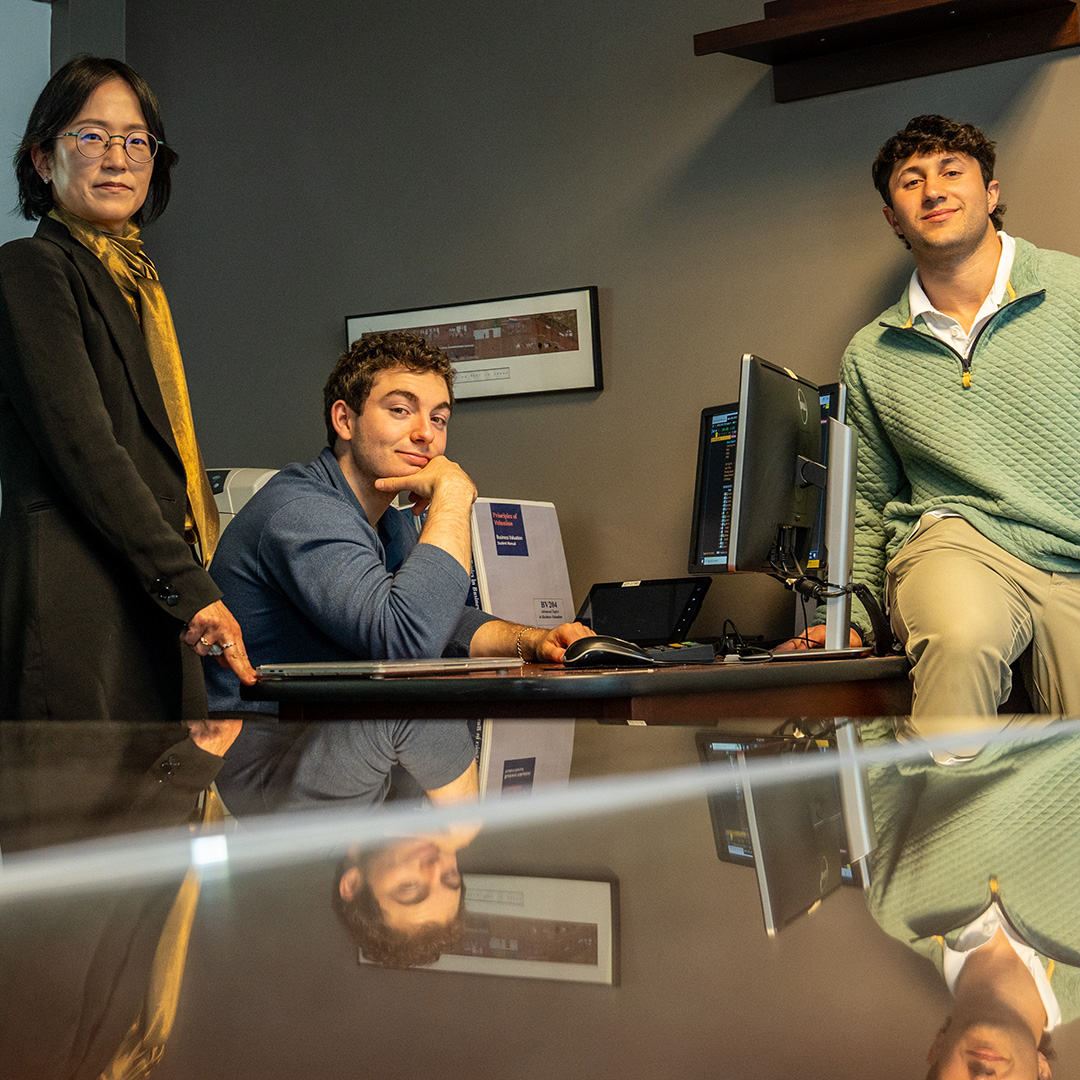Market moves
TCNJ’s Student Investment Fund is where real money meets real learning.

Seung Hee Choi, Sal Zotti '25, and Tyler Rummel '25
Tyler Rummel ’25 first noticed the stock ticker in his junior year. On the wall above an empty conference table on the second floor of the Business Building, the digital crawl made its way through the entire market, tracking the rise and fall of an endless string of corporate valuations. Long interested in the stock market, Rummel wondered what happened in that room. A fellow finance major filled him in: It was the home of the Student Investment Fund. Twice a week, a dozen or so students gather around the table and debate how they should manage nearly $1 million of real money, buying and selling with all the risk and reward of investment bankers. Rummel knew right away he wanted to be a part of it.
Launched 25 years ago by finance professor Herbert “Buddy” Mayo, the Student Investment Fund has helped train generations of TCNJ students for futures in finance and investing. For many, it has figured prominently in the job interviews that kickstarted their careers. The fund has grown from an initial $120,000 to more than $850,000, given financial support to 120 local students attending the college, and offered its members and education they couldn’t get any other way. “There’s no classroom setting like this,” Rummel says. When Mayo started the fund in 2000, he wanted students to have a hands-on opportunity to develop the skills they would need to guide investment strategies as professionals. He knew that typical classroom exercises would only count for so much. “Hypotheticals aren’t the real thing; they’re more like a game,” he says. Mayo reasoned that real money would bring real stakes. And real lessons learned. He wrote to the school’s finance alumni, promising to match any donations they made to seed the fund. And to ensure that the money would serve a material purpose as well as an educational one, he committed to delivering 3 to 4% of its annual balance to incoming first-year students from the Ewing community.
Each week, students divide into small teams and pitch which stocks they think the fund should buy or sell. Members present arguments and field questions from their classmates and their advisors — Mayo and his successor in the role, finance chair Seung Hee Choi. Pitches are put to a vote, requiring a two-thirds majority to pass. Although students receive independent study credit for their work with the fund, Mayo and Choi don’t treat it as a class. There are no lectures and no textbooks. Instead, the advisors prod the fund’s members with questions that force them to consider every angle of the decisions they’re making. The inquiries might even seem unkind, Choi admits, modeled as they are on the questions that occur in industry level fund meetings. But by facing them head-on, students learn to sharpen their pitches and meet the high standard expected of them. And, she says, “They learn to agree to disagree in a professional way.” They also learn to face their mistakes and fix them, which is why Choi says, “Losing is way more important than winning in this game.”
“This is a perfect place to fail,” says finance major Sal Zotti ’25, who was with the fund for a year. “We don’t want to fail the fund, but I’d be happy to fail in the way I’m approaching an analysis or presentation now, rather than when I’m at my job.” Zotti points to a pitch he worked on with Rummel for Lam Research Corp., a manufacturer of semiconductor equipment that they thought was worth more than its share price indicated. They overcomplicated their explanation of how they arrived at their valuation, faced stiff questioning, and saw the pitch vetoed. But, as Mayo and Choi would hope, they grew from the experience. “My next pitch after that, we knocked it out in one day because we focused on simplifying the story and simplifying the model,” Zotti says.
Zotti and his fellow fund members not only benefit from keen questions from their advisors but also from the support of a number of alumni who return each year to share insights from the field. For Cory Griffin ’11, who now leads real asset valuation at Apollo Global Management, the fund translated directly to the professional world of finance. “They’re not doing something like what I do,” he says. “They are doing it.” (The presence of the Bloomberg Terminal that initially attracted Rummel underscores that point: the real-time software is an essential tool for finance pros.) After a quarter-century in operation, the fund is still delivering pivotal lessons and shaping the futures of its members. With a curated selection of 50-plus tickers in its portfolio, it often outperforms the S&P 500, a stock market index that serves as its benchmark. And along the way, it’s handed out more than $100,000 in scholarships to TCNJ students from the Ewing community. “It should go on forever,” Mayo says.
For Rummel, the experience is“unmatched” by anything else in his academic career, he says, and that’s what brought him back this spring — one last chance to prepare himself for what lies ahead. “The class is so valuable to my personal and professional development,” he says, “that I’d have been doing myself a disservice if I hadn’t taken it again.”
Photo: Bill Cardoni
Posted on June 4, 2025

